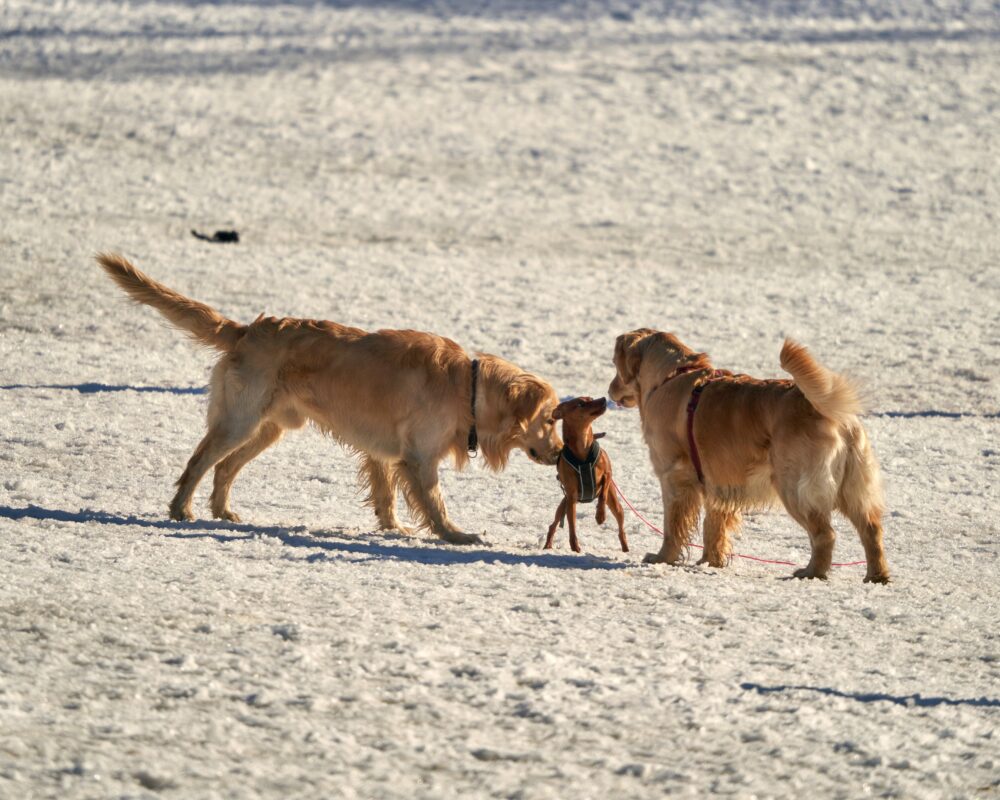Are Golden Retrievers Aggressive? The Honest Truth
Golden Retriever enthusiasts might bristle at the idea that their cherished pets could exhibit aggressive behavior. Indeed, the term “aggression” doesn’t sit right when discussing Golden Retrievers. These canines are known for their affectionate nature and devotion to their families.
Many professionals cite Golden Retrievers as exemplars of serene and friendly canine behavior. But what about Golden Retriever puppies? Like any young dog, they might playfully nip during their teething phase, accompanied by endearing growls.
Such behavior doesn’t indicate aggression; it’s just typical puppy behavior. However, failing to guide and socialize your puppy can turn these harmless habits into problematic behaviors.
Understanding Aggression in Golden Retrievers
Is aggression a recurring trait in Golden Retrievers? Rarely. Although they are fundamentally gentle, exceptions might arise. Still, such occurrences are generally sporadic and might never repeat.
Males and females display comparable temperaments, with males occasionally showing territorial tendencies, particularly before neutering. Nevertheless, aggression in this breed usually stems from unsound breeding, neglectful ownership, insufficient training, or inadequate socialization. Abuse and cruelty are also significant factors.
Golden Retrievers have even served as control groups in studies on dog aggression, reflecting their general non-aggressive nature. In one such study, only a minuscule fraction (just over 1%) displayed any signs of aggressive behavior.
Underlying Causes of Aggression in Golden Retrievers
Golden Retrievers are generally mild-mannered, making them family favorites. However, certain situations or conditions might trigger aggressive responses:
Fear:
Threats can induce defensive reactions in any dog. A history of physical punishment might cause a Golden Retriever to become wary of human interactions, equating hands with potential harm.
Perceived Threat:
While Golden Retrievers aren’t seen as typical guard dogs, they possess keen instincts. An aggressive response might indicate an unrecognized threat.
Past Trauma:
It’s tragic to think that such an amiable breed could suffer abuse. Golden Retrievers that have experienced trauma might react unpredictably.
Unfamiliar Environments:
Proper socialization equips dogs to handle diverse situations and interactions without resorting to aggression.
Health Issues:
Medical conditions can prompt aggressive behaviors, from overt signs like growling to subtler indicators. Certain conditions, like brain inflammation or hypothyroidism, can directly influence temperament.
Physical Pain:
An injury or discomfort can provoke aggression in any dog. If a typically gentle Golden Retriever begins displaying aggressive tendencies, a veterinary check might be warranted.
Irresponsible Breeding:
Proper breeding practices ensure the mental and physical well-being of dogs. Sadly, not all breeders prioritize the welfare of the animals, leading to health complications and behavioral issues.

Recognizing and Addressing Aggression in Golden Retrievers
Though rare, signs of aggression in Golden Retrievers can include raised hackles, baring teeth, lunging, and biting. If your Golden Retriever shows these signs, consider the following:
Root Cause Analysis:
First, identify the cause of the aggression.
- Early Socialization: Ensure early and regular exposure to various environments and beings.
- Breeder Selection: Choose breeders with a reputation for healthy, well-adjusted puppies.
- Training: Consistent, positive reinforcement training can help guide behaviors.
- Physical Activity: Regular exercise can help alleviate potential behavioral issues.
- Patience and Understanding: Recognize that, like humans, dogs have individual personalities and can have off days. Approach them with empathy and patience.
Conclusion
Are Golden Retrievers aggressive by nature? Unlikely. Their warm eyes and joyful demeanor speak volumes. External factors, such as poor breeding practices or trauma, can induce aggression in any breed. Ensure your Golden Retriever’s well-being through proper care, training, and, if necessary, veterinary consultation.
Make Sure You Get Paired With The Right Golden Retriever
One of the best ways to ensure you don’t get an aggressive Golden Retriever is by getting one through a reliable breeder. You can easily find one by checking out our puppies here!
All our puppies are raised by our own group of small, independent breeders who lovingly care for and socialize with each of them daily so they grow up happy. We even take all the extra steps to provide the best healthcare for them.
Frequently Asked Questions About Are Golden Retrievers Aggressive?
Are Golden Retrievers the friendliest dogs?
Golden Retrievers are often regarded as one of the friendliest dog breeds due to their affable and sociable nature. They are known to get along well with humans, other animals, and are frequently used as therapy and service dogs because of their temperament.
Is a Golden Retriever a good family dog?
Absolutely! Golden Retrievers are renowned for being excellent family dogs because of their gentle disposition, loyalty, and patience with children of all ages. Their playful nature and adaptability make them a beloved addition to many households.
Are Golden Retrievers fearless?
While Golden Retrievers are confident and can be protective of their families, they are not typically characterized as “fearless.” Their primary traits are friendliness and approachability, rather than aggression or fearlessness.
Why are Golden Retrievers so gentle?
Golden Retrievers have been selectively bred for generations for their gentle and friendly temperament, especially since they were initially hunting companions that needed to retrieve game without damaging it. Their inherent kindness, combined with proper training and socialization, contributes to their gentle demeanor.
What are Golden Retrievers’ weaknesses?
Golden Retrievers can be prone to certain health issues, such as hip dysplasia and heart problems. Behaviorally, their eagerness to please and friendliness can sometimes lead them to be overly trusting of strangers, and they might be inclined to overeat if not monitored.
What dog breed is the bravest?
Bravery in dogs can manifest in various ways, and different breeds exhibit courage based on their historical roles. For instance, German Shepherds and Belgian Malinois are often hailed for their bravery in protection and police work, while breeds like the Rottweiler and Bullmastiff have been known to bravely defend their families.
